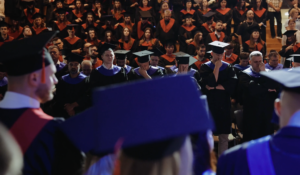
 Home schoolers and public schoolers … off with the gloves. Let's shake hands. There are millions of mothers who looked at the slovenly morality and weak A.B.C.s of America's schools and said, "Frankly, I can do it better."
Home schoolers and public schoolers … off with the gloves. Let's shake hands. There are millions of mothers who looked at the slovenly morality and weak A.B.C.s of America's schools and said, "Frankly, I can do it better."
And better they did!
Their home-schooled children have gone off to college and have done very well.
Their children won the national spelling bees while even the brightest of America's public schools stood back fumbling over syllables and "i before e" rules. Lately, spelling — and a lot of other disciplines — hasn't gotten the attention it deserves in many, if not most, public schools.
While public schools were encouraging third grade boys to explore their true sexual preferences, home-school children were working at math and the alphabet.
Public-school Johnny was good at video games but not at science.
He could play Space Invaders and trade Pokemon cards but, alas, he had little interest in the alphabet or fractions.
I must confess I came to believe in home schooling slowly. My daughter took our grandson out of a very elite private school to have a go at home schooling. I thought it was a mistake and told her so. She said she could do it better, and I told her "probably not." But in the next year or two I changed my mind. What brought it all about? It was the little things mostly.
One day I got my grandson's personal newsletter in the mail. His subscription list was small, but his book reviews and editorials were outstanding. Then we went — my grandson and I — to the Shakespeare Festival in Stratford, Ontario. When Banquo's ghost entered the stage, he leaned over to me and said, "Grandpa, don't you think it's amazing that the other actors are convincing the audience the ghost actor is invisible?"
I had never thought about it before, but it was rather amazing.
Later, when we were walking through a department store, he dropped his shopping bag, losing his flip-flop sandal while reaching to retrieve it. After picking them both up, he turned to me and said, "I dropped my bag, my shoe fell off." Then he asked, "Is that haiku, grandpa?" I quickly counted the line length and said no, but I realized that this little boy was familiar with a poetic form I had never heard of until I was in the ministry.
We have now sat and read whole books together out-loud. He reads better than I do.
He understands computers better.
He loves marine life and is learning scuba diving so he can someday work at the zoo.
I'm now convinced he's better off from studying with his mother for a while.
Some public school supporters have issued the cry that home-schooled children have poor social skills. I rode on the plane recently with three of the brattiest children I have ever seen set loose upon the public. Their mother apologized to nearby passengers, saying they were nearly perfect at school. I doubted it.
A recent study of preschoolers left with daycare centers revealed they were twice as likely to demonstrate anti-social behaviors as children kept at home. I doubt that home-school children, as a whole, have poor social habits. It's been my experience that home schoolers behave better and feel more at home in the company of adults. So it is with my grandson. But I must confess my worries have really begun in extremis. After teaching at home for six years, my daughter has put him back in a Christian school. I don't know if I really trust the teachers to do it as well as his mother did. But I am sure that since he had such good schooling at home, one poor teacher can't really hurt him now.
The proof text for home schooling may be as old as Deuteronomy 6:4-7:
Hear, O Israel: The Lord our God, the Lord is one. Love the Lord your God with all your heart and with all your soul and with all your strength. These commandments that I give you today are to be upon your hearts. Impress them on your children. Talk about them when you sit at home and when you walk along the road, when you lie down and when you get up. (NIV)
About 3,400 ago, Jews recognized the home as their children's classroom. Did the experience in education work? Of course, not all contemporary Jews continue this practice, but the apparent impact of their ancient heritage cannot be ignored. Beyond all relationship to their small population, Jews have continued to influence the world. Out of all proportion to their size they have produced the greatest number of doctors, lawyers, and financiers. By comparison with evangelicals, they are nearly free of juvenile delinquency. A mere coincidence? I doubt it.
So here's to a small group of mothers who won't be sending their children off to school this fall. They'll be keeping them in. Not all of them will do it well. Not all of them will do it right. And not every public school is poor. But in the interest of the A.B.C.s and mathematics, let's cheer, not scorn, the vast army of mothers who are first-class educators.










